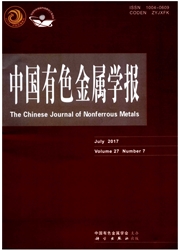

 中文摘要:
中文摘要:
采用乙二醇还原法并进一步热处理制备碳载Pd-Co—Au(Pd.Co—Au/C)三元合金纳米电催化剂,通过旋转圆盘和环盘电极等技术评价催化剂对氧气还原反应的电催化活性,并分析氧气还原的机理。结果表明:合成Pd—Co—Au/C催化剂中Pd和Au两相面心立方(fcc)结构共存,且随着热处理温度的提高,对应于Au的衍射峰强度减弱,而Pd衍射峰强度增强;当温度高于800℃时,形成具有Pd单相fcc结构的三元合金纳米催化剂。氧气还原反应的动力学表明:氧气在Pd-Co—Au/C三元合金催化剂上按4e路径还原为水。电化学表征表明,在酸性介质中,经800℃热处理的Pd7Co2Au1/C催化剂对氧气还原的电催化活性最高,接近于商业化Pt/C的性能;而在含甲醇的酸性介质中,Pd-Co—Au/C催化剂电催化氧气还原的活性显著高于Pt/C。因此,Pd-Co—Au/C是一种高抗甲醇的新型氧气还原反应电催化剂。
 英文摘要:
英文摘要:
Carbon-supported Pd-Co-Au temary alloy nanoparticle electrocatalysts were prepared by modified polyol reduction, and then heat-treated at 500-900 ℃. The electrocatalytic activities for the oxygen reduction reaction (ORR) were investigated based on porous rotating disk and disk-ring electrode techniques. The results show that the as-prepared Pd-Co-Au/C catalysts have broad reflections corresponding to the mixed Au and Pd face centred cubic (fcc) phases and the intensity of Au-rich phase relative to Pd-rich phase decreases with the increase of heat treatment temperature. When the heat treatment temperature is higher than 800 ℃, Pd ternary alloys with Pd fcc structure form. The electrochemical measurements indicate that the maximum catalytic activity for the ORR is found on the PdTCo2AuJC catalyst heat-treated at 800 ℃, which is close to the commercially available Pt/C. Kinetic analysis reveals that the ORR on Pd-Co-Au/C undergoes a four-electron process to water. Since Pd-Co-Au/C catalysts are inactive for the adsorption and oxidation of methanol, thus, they can be used as a new type of promising catalyst for methanol-tolerant ORR in a direct methanol fuel cell.
 同期刊论文项目
同期刊论文项目
 同项目期刊论文
同项目期刊论文
 nfluence of the Composition of Core-Shell Au-Pt Nanoparticle Electrocatalysts for the Oxygen Reducti
nfluence of the Composition of Core-Shell Au-Pt Nanoparticle Electrocatalysts for the Oxygen Reducti Low Temperature Preparation of Carbon-Supported Pd-Co Alloy Electrocatalysts for Methanol Tolerant O
Low Temperature Preparation of Carbon-Supported Pd-Co Alloy Electrocatalysts for Methanol Tolerant O One-Step Synthesis of Carbon-Supported Pd-Pt Alloy Electrocatalysts for Methanol Tolerant Oxygen Red
One-Step Synthesis of Carbon-Supported Pd-Pt Alloy Electrocatalysts for Methanol Tolerant Oxygen Red Surface and structure characteristics of carbon-supported Pd 3Pt 1 bimetallic nanoparticles for meth
Surface and structure characteristics of carbon-supported Pd 3Pt 1 bimetallic nanoparticles for meth The production of a high loading of almost monodispersed Pt nanoparticles on single-walled carbon na
The production of a high loading of almost monodispersed Pt nanoparticles on single-walled carbon na 期刊信息
期刊信息
